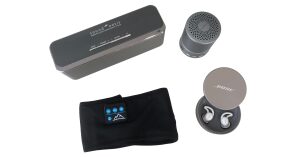In this article, we will share tinnitus success stories from six patients. Treble Health worked with these individuals via telehealth, and they all ultimately succeeded in managing their tinnitus. These stories highlight how even when tinnitus seems unmanageable at first, a person can achieve habituation and improve their overall wellness through concerted effort and commitment to a robust treatment protocol.
Before diving in, it’s important to understand that tinnitus habituation is often the best way to get better. Treble Health utilizes evidence-based practices for habituation that typically involve sound therapy and neuroplasticity coaching with one of our tinnitus specialists. While speed is not the focus, the quickest path to habituation often involves some combination of therapeutic and wellness-based treatments, all with the ultimate goal of promoting neuroplasticity.
Success Story #1: Julia
Julia joined as a patient in February 2021, after developing tinnitus and sound sensitivity a few months prior. Her condition was so pronounced that everyday sounds—like a car running or silverware clinking—were rendered intolerable, compelling her to use earplugs in everyday situations. When we initially consulted, Julia reported tinnitus awareness for 80% of the day and annoyance for 50% of the day, with an average tinnitus volume of 6 out of 10.
After consulting with Julia, we devised a treatment protocol to promote habituation and sound relief. This involved using ear-level sound therapy devices, as well as meeting on a biweekly to monthly basis for one-on-one neuroplasticity coaching, which is considered one of the most impactful treatments available. After an initial period of intense anxiety, stress, and insomnia, Julia began to habituate to her sound sensitivity and realize that it wasn’t that harsh.
While the amount of brain habituation we might see in any of our patients is variable and hard to predict, what we do know is that patients will have the best chances if they are provided with the aforementioned tools. So regardless of how long you’ve experienced tinnitus symptoms, healthy brain changes are possible through treatments that support neuroplasticity, like mindfulness, sound therapy, and holistic health.
After six months of treatment, Julia found that her tinnitus awareness decreased by 50% and that her tinnitus volume was down to a 4 out of 10. After another six months of treatment—one year in total—Julia reported that her hyperacusis had completely vanished, and that she was now able to go about her daily life without experiencing any sound sensitivity.
There are two kinds of hyperacusis (sound sensitivity) that patients may experience. One is a physiological sound sensitivity, where the brain produces a reaction to a stimulus. The other is the resistance and discomfort experienced by an incoming sound or tinnitus spike. This kind of sensitivity typically involves feelings of fear or anxiety.
While Julia no longer experiences hyperacusis after a year of sound therapy and treatment, her journey isn’t over yet. And that’s okay, as she has time on her side, and has shown that through her commitment to her treatment program she was able to achieve tinnitus habituation.
Success Story #2: Mary
Mary joined as a patient in early 2021, after a long history with tinnitus. Her first experience with tinnitus began in 2013 during a period of stress and anxiety. She continued to live with low-level tinnitus for six years, up until December 2019 when her tinnitus grew considerably louder, coupled by age-related hearing loss. When she finally consulted with us in 2021, she was reporting feelings of frustration and loss of concentration, with an overall tinnitus volume of 7 out of 10.
After consulting with Mary, we devised a treatment plan targeted towards dealing with negative associations. This involved holistic wellness, including good nutrition and sleep, as well as cultivating mental health. Additionally, we created a sound therapy plan that involved using a sound machine during quiet periods over the day.
After just four months, Mary reported that she no longer reacted to her tinnitus—the first signs of successful tinnitus habituation. Mary’s story serves as a testament to the fact that even if you’ve suffered from tinnitus for a long period of time—even as long as eight years in her case—habituation is still possible. For Mary, even though her tinnitus volume was roughly the same, she felt satisfied, thus showing that her brain’s reaction to her tinnitus was improving subtly and no longer triggering stress or anxiety.
Success Story #3: Matt
Matt joined as a patient in March 2021, following a major tinnitus spike. He had developed low-level tinnitus four years prior, but then experienced a significant tinnitus spike in tandem with some medical problems. He began to have trouble sleeping and focusing, and also reported anxiety. When we initially consulted, Matt reported tinnitus awareness for 80% of the day and annoyance for 50% of the day, with an average tinnitus volume of 6 out of 10.
After consulting with Matt, we devised a treatment plan that included sound therapy and hearing aids programmed for tinnitus, as well as one-on-one coaching. We also recommended different wellness treatments—such as mediation, yoga, and Tai Chi—to help with his anxiety. This focus on wellness also helped with improving sleep quality, and after two months he was able to get off his anti-anxiety medication. One-on-one coaching is a crucial component of any treatment protocol, as patients often feel overwhelmed by their tinnitus and need guidance from someone who is familiar with the steps to achieve habituation.
After about three months of treatment, Matt reported feeling “like a new man” and had achieved noticeable habituation, and no longer experienced any sound sensitivity. He was still using sound therapy for most hours of the day as well as adhering to the wellness protocol we recommended.
After six months, he reported tinnitus awareness for only 10% of the day and annoyance for 5% of the day, with an average tinnitus volume of 4 out of 10. His sleep was back to normal, and while he still heard his tinnitus, it was much softer. Matt’s story highlights how, by committing to a treatment plan, it’s possible to achieve noticeable tinnitus habituation and to restore a sense of normalcy back to life.


Success Story #4: Diane
Diane joined as a patient in April 2021 after developing tinnitus in one ear. The onset of her tinnitus coincided with receiving her COVID vaccine, a phenomenon that others have also reported. Diane reported trouble sleeping and insomnia after developing tinnitus, and was even prescribed Xanax—a strong benzodiazepine—to regulate her sleeping patterns. She also reported trouble concentrating, so much so that she had to take time off from work. When we initially consulted, Diane reported tinnitus awareness for 90% of the day and annoyance for 50% of the day, with a tinnitus volume of 7 out of 10 on bad days and 4 out of 10 on good days. She didn’t report any sound sensitivity.
After consulting with Diane, we devised a treatment plan built around sound therapy and holistic wellness. For her sound therapy, Diane used a tabletop sound generator—essentially, a high quality speaker that plays constant sound, such as white noise, brown noise, pink noise, or natural tones (rain falling, crickets chirping, etc.). Diane also committed herself to cutting down on fast food and processed sugars, and adopted such habits as meditating twice a day and walking outside.
After about three months of treatment, Diane reported noticeable periods of silence as well as better sleep. She was no longer on Xanax and had also lost 10 pounds. Her tinnitus awareness had dropped all the way down to 10%, with a tinnitus volume of 2 out of 10 on bad days. Diane’s rapid improvement is a result of her consistent sound therapy and holistic wellness. She didn’t spend her time scouring the internet for additional interventions or treatments, but instead directed her entire focus on the few habits that she knew would help support tinnitus habituation.
An important note about the COVID vaccine: there are others like Diane who have reported tinnitus after receiving the vaccine. One theory is that this is due to the neuro-inflammation response created by the vaccine (typical of any vaccine). But this theory also highlights that tinnitus is a neurological condition, and that the brain can ultimately adapt to it.
Success Story #5: Lucy
Lucy joined as a patient in early 2021 after reporting loud tinnitus in both ears over a period of eight months. She came to us after visiting her general practitioner and being told that her tinnitus would always be present. Lucy mentioned that her tinnitus was creating trouble sleeping and concentrating as well as triggering feelings of anxiety. When we initially consulted, Lucy reported tinnitus awareness for 100% of the day, with a tinnitus volume of 9 out of 10 on bad days. She also disclosed that she had high frequency hearing loss and wasn’t wearing hearing aids.
After consulting with Lucy, we created a treatment protocol that involved fitting Lucy with hearing aids and programming them for sound therapy, so that she would hear a quiet but consistent tone of white noise. We also provided one-on-one coaching in holistic health habits.
After six months of treatment, Lucy reported that she only heard her tinnitus during moments of stress—only 1% of the day—and that the volume was all the way down to a 1 out of 10, even when her hearing aids were off. Lucy’s case demonstrates the possibility of habituating completely to non-acute forms of tinnitus. While she mentioned that she had to work hard to first adopt such habits as consistent sound therapy and holistic health, she’s now able to live a normal and healthy life.
Success Story #6: Tony
Tony joined as a patient in 2021 after struggling with tinnitus for a year and a half. Tony’s tinnitus emerged during a period of stress and created difficulty sleeping at night and concentrating during the day. When we initially consulted, Tony reported tinnitus awareness for 60% of the day, with a tinnitus volume of around 5 out of 10. Tony also disclosed that he had mild hearing loss.
After consulting with Tony, we put him on a treatment protocol involving sound therapy and holistic health. Since he generally worked from home, he was able to play sound therapy from a speaker in his office. We also recommended daily meditation to help with easing the body’s stress response and activating the parasympathetic nervous system.
After six months of treatment, Tony reported tinnitus annoyance for only 5% of the day, alongside overall improvements in sleep and quality of life. He had adhered consistently to the sound therapy and wellness protocols, and mentioned that he no longer needed sound therapy for most of the day.
Overall, Tony’s case demonstrates that even in a period as short as six months, significant habituation can be attained. Moreover, while the volume of tinnitus might not change that much, the brain can still adapt to a point where tinnitus is no longer perceived as an annoyance.
Next Step: Book Free Consultation
- 75% of patients reduced their tinnitus within three months after following our recommendations.
- "I feel like Treble Health literally gave me my life back." - Randy S. (verified customer)
- Join thousands of people who have reduced their tinnitus after scheduling a free consultation.



















